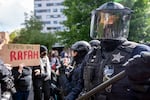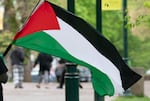When students return to Portland State University for the start of the fall term on Sept. 30, officials with the city and the university will still be navigating the ramifications of last spring’s contentious campus protests.
Dozens of people, including students, faced criminal charges stemming from a weeklong occupation of the university’s Millar Library. Dozens broke into the building on April 29, barricading doors and spray painting windows to protest Israel’s war in Gaza and the university’s ties to aerospace company and weapons manufacturer Boeing.
The protests came to a crescendo on May 2, when the Portland Police Bureau carried out a morning mission to clear the library and arrest demonstrators who had refused earlier offers to leave voluntarily.

FILE - Law enforcement teams clear protesters from Portland State University’s Branford Price Millar Library, May 2, 2024.
Kristyna Wentz-Graff / OPB
University officials aren’t yet free of the quagmire. A number of demonstrators face criminal charges and potential sentencing in the months ahead. The university is also accused of targeting a pair of pro-Palestinian protesters who didn’t get arrested, but allegedly violated the school’s student code of conduct.
Protests against Israel’s incursions in Gaza swept across the country last spring, with notable demonstrations at Columbia University and Harvard University, among others. A number of students were arrested during the protests, and some schools have since changed their policies to prevent actions of the same kind from happening again.
The University of Oregon and Oregon State University also saw protests last spring.
As a result of the Portland State protest, 27 people faced criminal charges from the day of the sweep, the Multnomah County district attorney’s office said. On May 2, police spent about four hours systematically clearing the building of encampments, then quelled a smaller group’s effort to retake the library hours later.
Almost all of the cases are still open with the first demonstrator set to be sentenced next month. Most of the arrestees were not students at the university and many face misdemeanor charges of criminal trespass.
Some face more serious charges, however. Prosecutors accuse a handful of demonstrators of attacking police during the sweep. One man is accused of spraying officers with a fire extinguisher, and another of ramming officers with a makeshift shield.
On May 2, some protesters tried to stop police vans transporting arrestees, leading to further clashes. One man is accused of throwing a metal garbage can that struck a police officer.
Demonstrators caused about $1.23 million in property damage, according to university estimates. The library reopened last week after five months of repairs.

Football players practice is seen from the second story of Portland State University's library on Sept. 19, 2024, with a note reading "Gaza We Love You" written between the windows. The library recently reopened spending months repairing the impacts of a four-day protest.
Troy Brynelson / OPB
University officials declined to identify which people charged are students, but confirmed that six were arrested. PSU spokesperson Katy Swordfisk said the university has opened 32 disciplinary cases related to student conduct during the spring protests, but declined to identify the students. They could face suspension, academic probation, expulsion or “financial restitution,” Swordfisk said.
Two of those students who joined protests in late May — after Portland State was back in control of the library — say they are being targeted by the university. They allege in court filings that the university is weaponizing the student code of conduct to retaliate and harass them.
After the May 23 protest, Makayla “Topaz” Arnold and David Mosqueira said that video of the incident showed Portland and campus police used excessive force against them, and signaled in a letter they intended to file a lawsuit.
After they did, through the pair’s attorney, Michael Fuller, the university sent notices to Arnold and Mosqueira accusing that they may have violated code of conduct policies. That prompted the pair’s lawsuit alleging unlawful retaliation.
“Oregon law does not allow a public university to retaliate against and harass students,” Fuller told OPB.
University officials declined to comment because Swordfisk said the civil lawsuit is active and involves information protected by student privacy laws.

FILE - A protester carries a flag in Portland State Univeristy’s South Park Blocks, April 26, 2024.
Kristyna Wentz-Graff / OPB
Meanwhile, the first anniversary of the Oct. 7 attack on Israel, led by the militant group Hamas, is just weeks away, potentially sparking further demonstrations. Officials at the University of Oregon and Oregon State University told OPB they have not made any significant changes to their policies or security since last spring’s protests.
Likewise, Portland State has not changed any policies. Aimee Shattuck, executive director of student activities and leadership programs, said the only proactive plan is to monitor other schools for protest activity. Shattuck said the school feels confident in its policies that predate the protests.
“We decided we didn’t need to create any new policies or new rules or clamp down on things because it was solid,” Shattuck said.
Portland State launched a “free speech” website after the protests to put those policies all in one place, Shattuck said.
“We support free speech and free expression while requiring all members of our community to adhere to campus policies,” Swordfisk added in a written statement. “As a campus community we reject antisemitism, anti-Palestinian hate, or any form of violence or identity-based discrimination or bias.”
OPB’s Tiffany Camhi contributed reporting.



